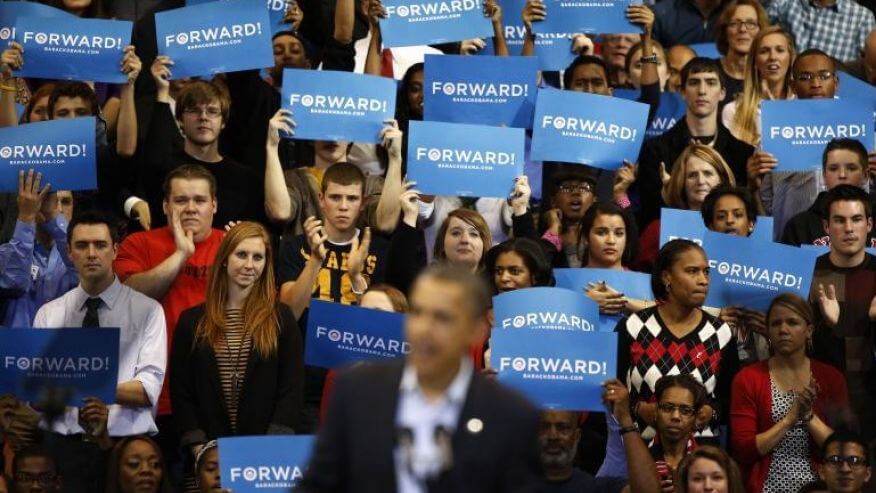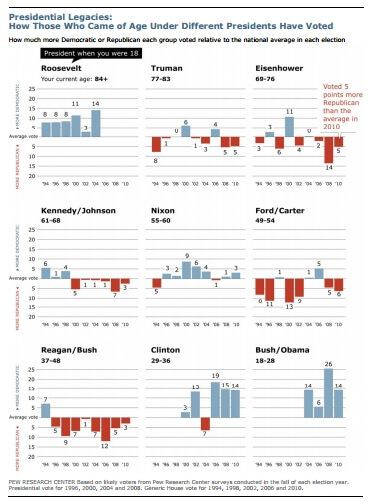Ricochet is the best place on the internet to discuss the issues of the day, either through commenting on posts or writing your own for our active and dynamic community in a fully moderated environment. In addition, the Ricochet Audio Network offers over 50 original podcasts with new episodes released every day.
 The Impending Death of the Republican Party Has Been Greatly Exaggerated
The Impending Death of the Republican Party Has Been Greatly Exaggerated
 It is a time of great change in American politics. Long-established voting patterns have been disrupted. Messages that resonated with the previous generation fall flat on the ears of the young. One political party is losing the under-35 vote so severely that their ability to win future presidential elections is in doubt. Strategists scramble to find ways to make their party appeal to these young voters, who have been raised in an era so very different from that of their parents. The year is 1989.
It is a time of great change in American politics. Long-established voting patterns have been disrupted. Messages that resonated with the previous generation fall flat on the ears of the young. One political party is losing the under-35 vote so severely that their ability to win future presidential elections is in doubt. Strategists scramble to find ways to make their party appeal to these young voters, who have been raised in an era so very different from that of their parents. The year is 1989.
It is said that history doesn’t repeat itself, but that it does rhyme. In the case of parties losing the youth vote and then fretting about their future, the same word has been rhymed with itself, as if the song of history was written by Kanye West. Before conservatives begin passing out the Kool-Aid or making evidence-free demands about how the Republican Party must change to appeal to young voters, it would benefit us to gain some historical context.
Our journey begins with a New York Times op-ed written in 1988 by a pre-midlife crisis E.J. Dionne.
It is said that the future belongs to the young, which gives the Republican Party a lot to look forward to.
Whoever wins the 1988 Presidential election, the Republican Party has made major strides in this election year and in the previous seven years, not only holding but expanding its advantage among young people, largely because of the appeal that Ronald Reagan, the nation’s oldest President, holds for the young.
Let us first enjoy a quick laugh at Dionne’s inability to get through his opening paragraph without a “Reagan is old” crack. Let us then get to the meat of this 27-year-old article which, if you only switch a few nouns, could have been written today.
Younger voters are poised to vote heavily for Vice President Bush, and their long-term inclinations represent the party’s best hope of escaping the minority status it has held since the New Deal.
In the latest Times/CBS News Poll, voters under 30 favored Mr. Bush by 64 percent to 28 percent. Mr. Bush did far better with these voters than with any other age group in the electorate.
Dionne went on to argue that these voters were really closet socialists; a prediction that did not withstand the test of time. Yet the piece is instructive in understanding the Republican Party’s current struggles with young voters.
Academics and political consultants who have studied the youth vote have many explanations for their movement toward the Republicans, but the most powerful is the simplest: Young Americans have known only Mr. Reagan and Mr. Carter as President, and Mr. Reagan is the overwhelming favorite. Similarly, many people who first voted in the Depression still see politics in terms of the Democratic President Roosevelt and the Republican President Hoover.
This diagnosis is as correct today as it was 1988. Most people do not parse the parties issue-by-issue in an effort to find out which one best fits their political preferences. They look around and see how good or bad things are at present, and assign credit or blame to whoever owns the White House. This preference then has a tendency to hold on for life.
The chart below was created by Pew Research and breaks down the 2012 electorate by age. Specifically, it groups voters by the year they turned 18 and tracks their voting preferences in comparison to the average of the electorate. The pattern is abundantly clear.

FDR created a large group of young voters who went on to prefer the Democrats — even today. Truman and Eisenhower bred mostly Republicans. Kennedy made Democrats, while Johnson minted Republicans. Nixon spawned Democrats, while Carter and Reagan produced Republicans.
The voting habits of millennials are not difficult to understand. Bill Clinton presided over a booming economy, and the earliest millennials (my classmates) became largely locked in as future Democrat voters. The last few years of the Bush Administration featured an economic downturn paired with unpopular wars.
Plans to court these voters are doomed to fall flat, as it can be seen that nothing in the intervening 70 years caused voters who were alive for the New Deal to question the viability of the liberal project. This generation of young people will favor the Democrats until the day they die. The GOP changing their stance on abortion, same-sex marriage, or any number of other positions will likely have no significant effect on these voter’s preferences.
But what of the future? American political history suggests that either a successful Republican president or a failure-prone Democrat will create the next generation of Republicans. That failure-prone Democrat may have been Barrack Obama, as the youngest millennials (18-20) probably went for Romney in 2012. If Scott Walker (or pick your non-Trump candidate) were to be elected, and repeal the worst of Obama’s regulations on businesses, the economic improvements would likely lead to this trend’s continuation. A Hillary Clinton Administration would feature her unique ability to make people dislike her the more she is in the news, also almost assuredly creating a new crop of Republicans.
The Republican Party has problems, but they are hardly new or particularly insurmountable when judged in proper context. What has been will be again, what has been done will be done again; there is nothing new under the sun.
Published in General, Politics



The bill had these things in theory. What it lacked was
A) Triggers to insure that if enforcement benchmarks were not hit, legalization would never begin
B) A Republican in office to see that enforcement actually happened
A good Republican would not have supported the final bill. Oh look! Rubio didn’t support the final bill.
You know what e-verify is, right?
I did check the link. Rubio said many things in relation to reform, he NEVER said that he was voting against the bill because it couldn’t pass. That is an incoherent interpretation supplied by the author.
Rubio did say that the bill couldn’t pass (which he was correct about). Trying to insert this as his motivation is substituting your own (or the blogger’s own) words into a context that Rubio never said them.
No, what I am suggesting is that
A) A decade long path to citizenship with harsh requirements (including going to the back of the line) is not a blanket amnesty
B) When paired with enforcement, is far better than the situation we presently have
My ideal reform would have enforcement passed with no path to citizenship until we have a decade’s worth of proof that it is working. Then we can worry about how to deal with those currently in the country.
You do have to get use to the idea that those people are already here, and even if you deport them, are already creating new Americans who you can’t deport.
I like your OP, Frank. Wanted to throw that in there, before we go off into another immigration argument…
He is not the youngest candidate, that goes to Jindal who is 13 days younger than Rubio.
They’re both 45 but Rubio looks like he’s 35 and Jindal Looks like he’s 55.